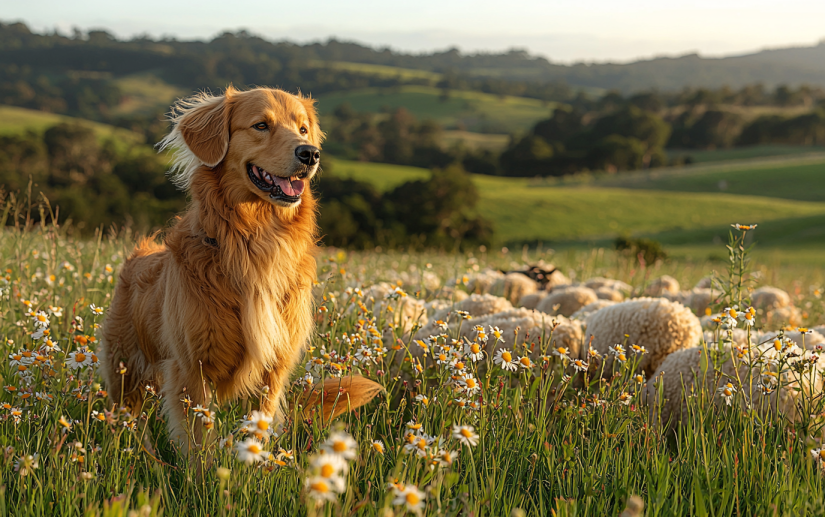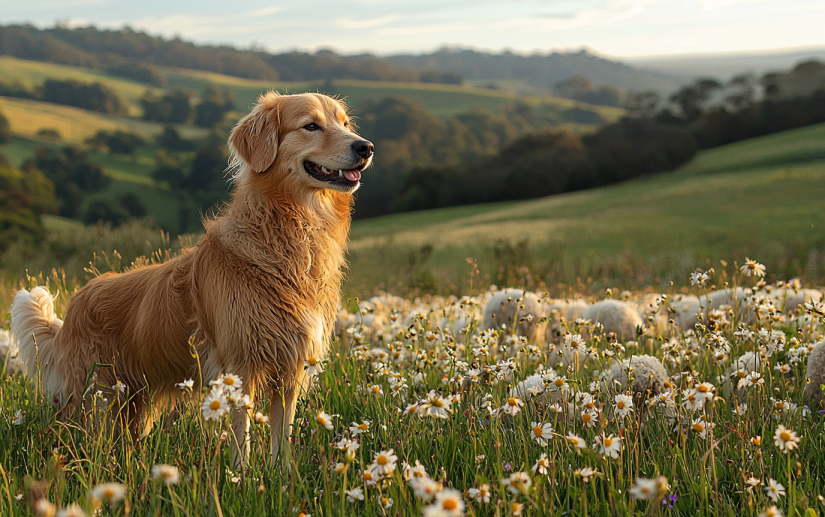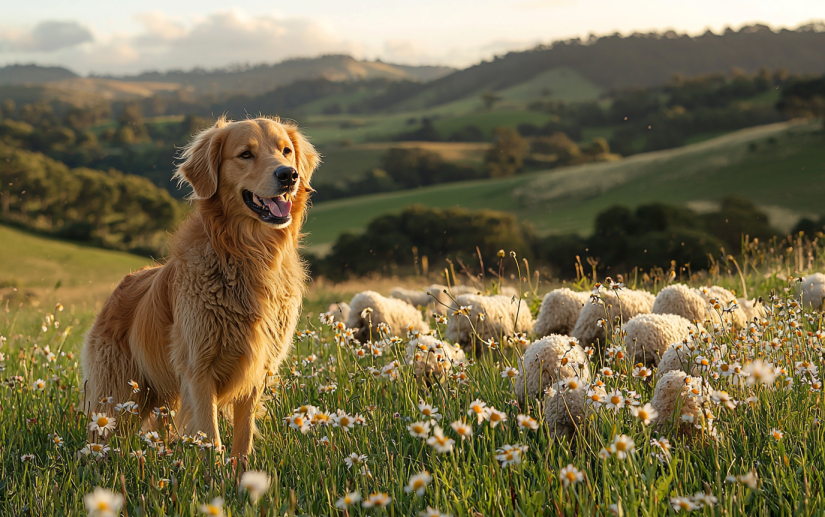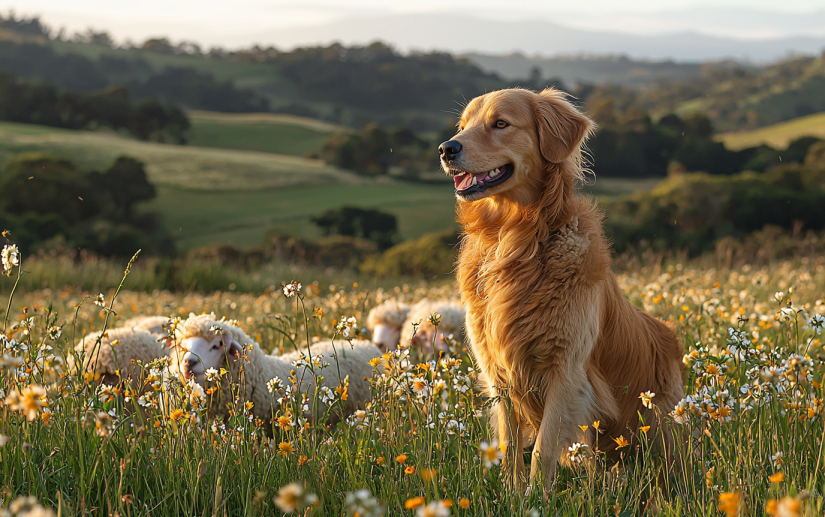Herding Dogs
Herding dogs, often referred to as “pastoral” dogs, were originally bred to control and manage livestock such as sheep, cattle, and goats. These breeds are highly intelligent, energetic, and trainable, which allows them to take on tasks that require decision-making and independence. Over time, herding breeds have also found their place as beloved family pets, thanks to their loyalty and ability to form strong connections with their human companions.
Many herding breeds possess the drive to work and need regular mental and physical stimulation to stay happy and healthy. While they’re excellent at herding livestock, they also excel in various dog sports, including agility, obedience, and even search and rescue. Their versatile nature makes them ideal for active families who can provide the right balance of exercise and companionship.
What Makes Herding Dogs Unique?
Herding dogs are a special group of canines with unique qualities that set them apart from other breeds. Here’s what makes them so remarkable:
1. Intelligence: Herding dogs are among the most intelligent of all dog breeds. They can quickly learn commands, solve problems, and adapt to new situations. Their sharp minds were essential for handling large herds of animals, often without constant human direction.
2. Strong Work Ethic: These dogs were bred for work, and that drive hasn’t disappeared. Whether they’re on a farm or in a family home, herding breeds have a natural desire to stay busy. They excel when given a job to do, which could range from herding livestock to participating in dog sports.
3. Loyalty and Bonding: Herding dogs are known for forming strong bonds with their families. They are protective, loving, and often attach themselves closely to one or two family members. This loyalty makes them excellent companions.
4. High Energy Levels: Herding breeds are active dogs that require plenty of physical activity. They need daily exercise, which can include long walks, runs, or playtime in a fenced yard. Mental stimulation is equally important to keep them from getting bored and displaying destructive behaviors.
5. Versatility: While their herding instincts make them excellent working dogs, herding breeds also excel in obedience, agility, search and rescue, and even therapy work. Their versatile nature means they can adapt to many different roles, making them great for both working environments and active family homes.
The Top 10 Herding Dog Breeds

Now, let’s dive into the top 10 herding dog breeds that are smart, loyal, and make exceptional companions.
1. Border Collie
The Border Collie is widely regarded as the most intelligent of all dog breeds. Known for its quick thinking, boundless energy, and tireless work ethic, the Border Collie is a top choice for anyone looking for a herding dog that can excel in nearly any activity. Whether herding sheep or competing in agility trials, Border Collies are driven, focused, and always eager to learn.
- Temperament: Highly energetic, intelligent, and affectionate.
- Best For: Active owners who can provide plenty of exercise and mental stimulation.
- Exercise Needs: Extremely high.
2. Australian Shepherd
Despite its name, the Australian Shepherd was actually developed in the United States. These dogs are intelligent, versatile, and known for their striking, merle-colored coats and bright blue eyes. Australian Shepherds are excellent herders, but they also thrive in various dog sports and make wonderful companions for active families.
- Temperament: Smart, energetic, and playful.
- Best For: Families that enjoy outdoor activities like hiking or running.
- Exercise Needs: Very high.
3. German Shepherd
The German Shepherd is one of the most popular dog breeds in the world, known for its intelligence, loyalty, and versatility. While they were originally bred as herding dogs, German Shepherds have found success in a wide range of roles, including police work, search and rescue, and service dog duties. They are courageous, confident, and protective of their families.
- Temperament: Loyal, confident, and protective.
- Best For: Families looking for a protective and highly trainable companion.
- Exercise Needs: High.
4. Shetland Sheepdog
Often affectionately called “Shelties,” Shetland Sheepdogs are small but mighty herders. They look like miniature Rough Collies and share the same intelligence and work ethic. Shelties are quick learners, making them excellent competitors in obedience and agility. Their size also makes them more adaptable to smaller living spaces, but they still need plenty of exercise.
- Temperament: Playful, intelligent, and gentle.
- Best For: Families or individuals looking for a smaller herding dog with high energy.
- Exercise Needs: High.
5. Pembroke Welsh Corgi
Don’t let their short legs fool you! Pembroke Welsh Corgis are excellent herders with boundless energy and a playful, affectionate nature. Originally bred to herd cattle, these small dogs have a big personality and are surprisingly agile. They are a great choice for families, as they are affectionate and enjoy being part of the action.
- Temperament: Outgoing, affectionate, and bold.
- Best For: Families or individuals who want a small dog with a lot of personality.
- Exercise Needs: Moderate to high.
6. Belgian Malinois
The Belgian Malinois is a herding dog with a serious work ethic. These dogs are often used in police and military work due to their intelligence, athleticism, and strong drive. They are fast learners, highly obedient, and incredibly protective of their families. While they make great companions for active owners, they need plenty of physical and mental stimulation to stay happy.
- Temperament: Protective, intelligent, and energetic.
- Best For: Experienced dog owners looking for a high-energy, working dog.
- Exercise Needs: Very high.
7. Old English Sheepdog
With their iconic shaggy coat, Old English Sheepdogs are hard to miss. Despite their fluffy appearance, these dogs are strong and capable herders. They have a gentle and easygoing temperament, making them wonderful family pets. However, they do need regular grooming and plenty of exercise to stay healthy and happy.
- Temperament: Gentle, easygoing, and affectionate.
- Best For: Families with time for grooming and outdoor activities.
- Exercise Needs: High.
8. Collie
Collies, made famous by the TV show Lassie, are known for their beauty, intelligence, and loyalty. These dogs are excellent herders and make wonderful family pets due to their gentle nature. Collies are great with children and are highly trainable, making them a popular choice for families.
- Temperament: Loyal, gentle, and intelligent.
- Best For: Families looking for a gentle and intelligent dog.
- Exercise Needs: Moderate to high.
9. Catahoula Leopard Dog
The Catahoula Leopard Dog is a versatile working dog with striking coat patterns. Originally bred in the southern United States to herd cattle and wild boar, these dogs are tough, independent, and strong-willed. They are best suited for experienced owners who can handle their independent nature and give them the exercise they need.
- Temperament: Independent, energetic, and protective.
- Best For: Experienced owners who can provide plenty of space and exercise.
- Exercise Needs: High.
10. Australian Cattle Dog
Also known as “Blue Heelers” or “Queensland Heelers,” Australian Cattle Dogs are highly energetic and intelligent herding dogs. These dogs were bred to herd cattle in the harsh Australian outback, and they have a reputation for being tough, hardworking, and incredibly loyal. They need plenty of physical and mental exercise to keep them happy, and they form strong bonds with their families.
- Temperament: Loyal, energetic, and intelligent.
- Best For: Active families or individuals who love outdoor adventures.
- Exercise Needs: Very high.
Why Choose a Herding Dog as a Companion?

Herding dog breeds are much more than just working dogs—they are loyal companions with a deep sense of devotion to their families. If you’re an active person or have an energetic family, a herding dog could be the perfect fit. Here are a few reasons why you might want to consider a herding dog:
Loyalty: Herding dogs tend to form strong bonds with their owners, often becoming very attached and protective of their family.
Trainability: Their high intelligence makes herding breeds incredibly trainable. Whether you want to teach basic commands, advanced tricks, or participate in dog sports, herding dogs are up for the challenge.
Active Lifestyle: If you enjoy outdoor activities like hiking, running, or playing fetch, a herding dog will happily join in. They thrive on physical activity and mental challenges.
Companionship: While herding dogs are great workers, they are also affectionate pets that enjoy spending time with their human companions.
Training Tips for Herding Dog Breeds
Training a herding dog can be a rewarding experience, but it requires consistency, patience, and plenty of positive reinforcement. Here are a few tips to help you get started:
1. Start Early: Begin training as early as possible. Herding dogs are quick learners, but starting early will help set boundaries and prevent bad habits from forming.
2. Positive Reinforcement: Reward-based training is highly effective with herding breeds. Use treats, praise, and toys to encourage good behavior and reinforce commands.
3. Mental Stimulation: Herding dogs are intelligent and need mental challenges to stay engaged. Puzzle toys, interactive games, and training sessions that require problem-solving will keep them mentally sharp.
4. Socialization: Introduce your herding dog to different environments, people, and animals early on. Socialization helps prevent behavioral issues like over-protectiveness or fearfulness.
5. Keep Training Fun: Herding dogs love a challenge, so make training fun and engaging. Mix in games and activities that allow them to use their natural instincts, such as herding-style games or agility training.
Caring for a Herding Dog: Health, Exercise, and Grooming

Herding dogs are generally healthy, but they do require regular care to ensure they remain happy and well-balanced. Here are some important aspects of caring for a herding breed:
1. Exercise Needs: Herding dogs have high energy levels and require daily exercise. Long walks, runs, playtime, and interactive games will help them burn off excess energy.
2. Mental Stimulation: These intelligent dogs need mental challenges in addition to physical exercise. Incorporate puzzle toys, obedience training, and interactive games into their routine to keep them engaged.
3. Grooming: Depending on the breed, herding dogs may have different grooming needs. Dogs with long coats, like the Old English Sheepdog or Collie, will need regular brushing to prevent matting. Short-haired breeds like the Australian Cattle Dog require less grooming but still need occasional brushing.
4. Health Considerations: Herding breeds can be prone to certain genetic health issues, such as hip dysplasia, eye problems, or joint issues. Regular vet check-ups and a healthy diet will help keep your dog in top shape.
Conclusion
Herding dog breeds are a unique combination of intelligence, loyalty, and energy, making them excellent companions for the right families. Whether you’re looking for a working dog or a loving family pet, herding breeds offer endless possibilities for adventure, bonding, and companionship. However, they do require an active lifestyle and mental stimulation to stay happy and well-balanced. With proper care, training, and attention, herding dogs will reward you with their unwavering loyalty, sharp minds, and affectionate nature.
If you’re ready for a smart, loyal, and energetic companion, any of these top 10 herding dog breeds could be the perfect fit!





